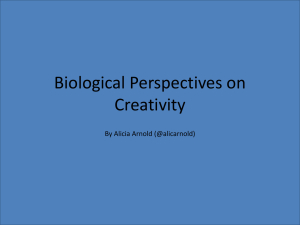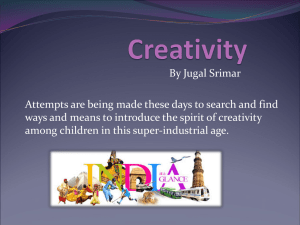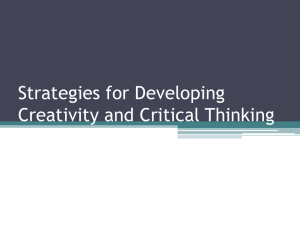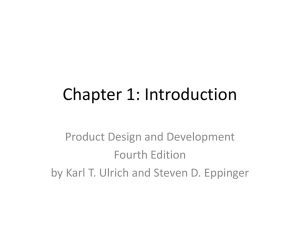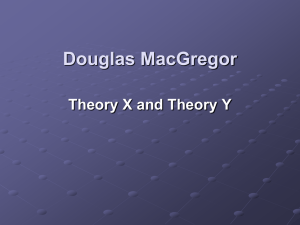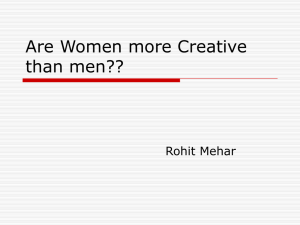Creativity and Health A Deleuzian Tautology?
advertisement
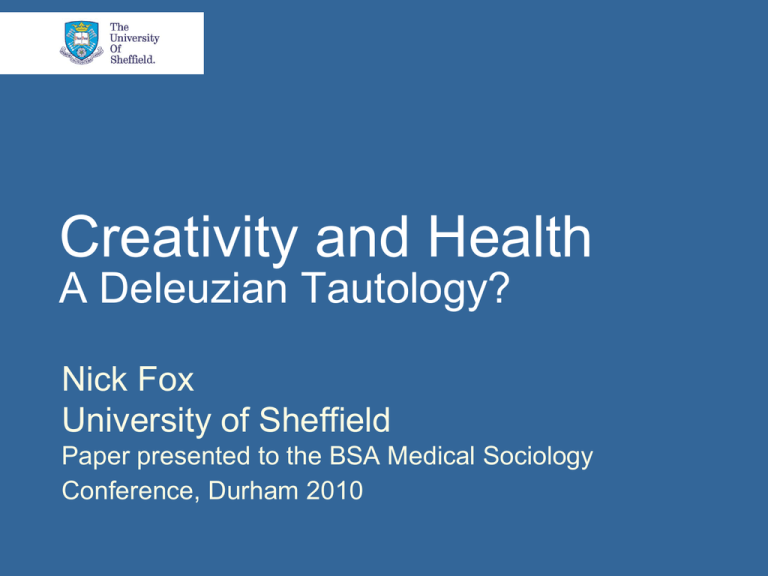
Creativity and Health A Deleuzian Tautology? Nick Fox University of Sheffield Paper presented to the BSA Medical Sociology Conference, Durham 2010 Introduction • What is Creativity? • Sociological Approaches to Creativity • Is Creativity Good for Our Health? • A Deleuzian Perspective on Creativity and Health • Creativity and the Body without Organs What is Creativity? I looked for an answer to this within: • Psychology: a personality trait independent of cognition • Psychoanalysis: a sublimation of unconscious desire, usually sexual • Marxism: a representation of class interests • Evolutionary theory: successful adaptation Mark Rothko at work Sociology and Creativity 1 Sociology tends to focus on the contexts of creative production ‘ ... aesthetic and scientific practices connect even in their most intimate moments of genesis with concrete social and institutional conditions ‘ (De Fillippi et al 2007) Sociology and Creativity 2 Creativity is a social process: ‘... anything that people can examine and judge, including communicated ideas and processes judged independently of the outcomes they produce. ... a subjective judgment made by members of the field about the novelty and value of a product (Ford 1996) Exhibits at the Royal Academy summer exhibition What have we learnt? • Not a lot • All the theories skirt around the question of the creative process • The missing body: need for an embodied approach to creativity • Can the relationship between creativity and health help? Is Creativity Good for Us? • Liberal humanist view that high art is good for the soul, morality and social order • Popular view that the arts contribute to the quality of life • Art and music therapy • Arts and health movements (e.g. writers, artists in residence): under-theorised Assumptions of the Arts and Health Movement • Creativity can be therapeutic • Creative products can ‘humanise’ modern institutions such as hospitals and schools • Creative products improve the health of those in their vicinity • BUT ... Is this True? • Thomas Chatterton • Vincent Van Gogh • Amadeo Modigliani Edvard Munch: ‘The Scream’ Wallis: ‘The Death of Chatterton’, 1856 A Deleuzian Perspective • Gilles Deleuze: influenced by Nietzschean concept of ‘the will to power’ • Embodied conception of positive desire that motivates organisms • The ‘body-without-organs’ describes what a body can do and what it can become: its relations and affects Relations and Affects • The sum of psychological, emotional and physical connections that a body has: with family and friends, with colleagues, with objects or activities, or with abstract ideas and social constructs. • These establish the limits of the BodyWithout-Organs Deleuze and Creativity • From this perspective: • Creativity is the positive desire of the organism: the capacity to engage ‘productively’ • Creative products (artistic, crafts, science, writing, cookery, sexuality etc) are the ‘becoming-other’ of the body • Creativity reflects the relations and affects of the producer Jackson Pollock: Untitled no. 3 Deleuze and ‘Health’ • From this perspective: • Health is also a reflection of what a body can do: its capacity to become other • The sum of the BwO’s relations and affects define its health Implications • It would not be surprising to find a relation between creativity and health • The two concepts are both aspects of the capacity of a body to become other • The arts and health movement may assess how creative processes may contribute to well-being: of producers or recipients Conclusions • The Deleuzian perspective offers a theoretical underpinning for those working on creativity and health • There is a need for empirical studies using these theoretical tools, to learn more about creativity production and reception and health and sickness
